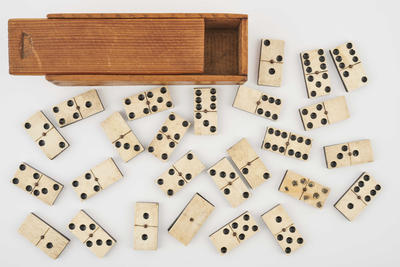Dominoes
Game
Maker & role
Unknown, Maker
Production date
circa 1850
See full details
Object detail
Production place
Collection
Measurements
3:30 - dominoes, H: 2 x W: 4.5 x D: 0.8cm (H: 20 x W: 45 x D: 8mm)
Credit line
Purchase, 1995
Susannah Place Collection, Museums of History New South Wales
Susannah Place Collection, Museums of History New South Wales
Caption
Set of dominoes, maker unknown, circa 1850, bone and timber
Description
The dominoes in this boxed set are hand-carved from bone, with ebony wood backing secured with a with a brass pin through the centre of each tile. The tiles measure 4.5cm x 2cm and are 8mm deep, and are housed in a timber box with sliding, recessed lid. The set is incomplete, containing 28 of 30 tiles.
Dominoes have been played for centuries by adults and children alike. Dozens of games of varying complexity have been developed, most of them involving strategy and luck. For the basic game, players draw an equal number of tiles, and take turns to build onto a starting tile by placing a tile with a matching number against the one in play. The tiles can be placed against the ends or side of the tile with the corresponding number, or across the middle of a ‘double’, allowing the board to grow in multiple directions. The first player to use all their tiles wins the game, or if the game is ‘blocked’ and no player can use their final tile, a winner can be decided by other agreed means, for example, the person with least number of tiles in their hand, or with the least ‘value’ remaining on tiles in their hand. The game can also be played ‘solitaire’.
Until man-made materials such as plastic became cheaply available in the twentieth century, dominoes were commonly made from animal bones (ivory was used for more expensive versions). Markings were carved into the bone and coloured with black ink or inlaid with ebony.
Dominoes have been played for centuries by adults and children alike. Dozens of games of varying complexity have been developed, most of them involving strategy and luck. For the basic game, players draw an equal number of tiles, and take turns to build onto a starting tile by placing a tile with a matching number against the one in play. The tiles can be placed against the ends or side of the tile with the corresponding number, or across the middle of a ‘double’, allowing the board to grow in multiple directions. The first player to use all their tiles wins the game, or if the game is ‘blocked’ and no player can use their final tile, a winner can be decided by other agreed means, for example, the person with least number of tiles in their hand, or with the least ‘value’ remaining on tiles in their hand. The game can also be played ‘solitaire’.
Until man-made materials such as plastic became cheaply available in the twentieth century, dominoes were commonly made from animal bones (ivory was used for more expensive versions). Markings were carved into the bone and coloured with black ink or inlaid with ebony.
Accession number
SP95/8-1:30



Public comments
Be the first to comment on this object record.